Text
Where Security Meets Sovereignty and International Law - Fox News
By Felicia Audrey Nugroho (14/8/22)
The press conference in the UNSC sheds some light on the perspectives of its delegates.
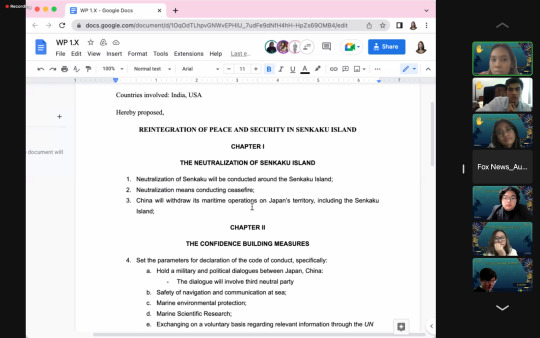
(Source: taken by Fox News journalist; capture of discussion on working paper from Day 2)
The United Nations Security Council (UNSC) started its critical day of decision-making with a press conference from journalists from numerous news agencies. Being the last day for delegates to decide upon a solution to the issue, hopes are being held high for a point of peace to be reached.
Through a press conference with Fox News, delegates of the United States of America, India, and the United Arab Emirates shared their thoughts on the dispute, in terms of sovereignty and international provisions. Prior to this, the council spent its time formulating plans to work with China's unexpected absence, and finding ways to form a consensus with one another.
The United States of America began the press conference by providing insight to a question on whether ownership of the Senkaku Islands should be settled to one side and how conflict might occur in the absence of doing so. The first representative of the USA presented their thoughts to the council, stating, “We believe that if this conflict or this ownership is not settled by today, it could lead to further conflicts. This is usually happening to any other territorial dispute around the world, citing the Kashmir conflict, and so forth.” A highly agreeable statement, reminding us all of the importance of settled sovereignty and concrete authority.
The country's perspective on what can be done was shared by a second representative, who then said, “In the USA's proposal, we recognized certain legal international governments to reaffirm state commitments in promoting peace and stability in the ocean spheres,” stated the delegate.
The talk on solutions continued with the next inquiry, where the Indian delegation addressed their support for neutralization. “We see it as one of the most ideal solutions because neutralization means demilitarizing the islands. We believe that China’s there, trying to be offensive to Japan since the Senkaku Islands belong to Japan’s territory,” the Indian delegate said. The delegate added that they have several sanctions prepared, one of which is an economic sanction that will be executed by embargoing weapon exports and freezing financial assets.
As the press conference came to a close, delegates continued with their debate upon solutions. It is clear that progress is being made steadily, and we are hopeful that the UNSC delegates will reach a consensus as the last session approaches.
0 notes
Text
“We Need the Collaboration of Member States”, Spain Urges in an Effort to Regulate PMCs - The BBC
By Nyoman Wina Panjali Putri (14/8/22)

Image: Spanish national army., Source: https://hips.hearstapps.com/hmg-prod/images/spanish-legionnaire-parade-to-mark-the-spanish-armed-forces-news-photo-1584994773.jpg
Following the discussion on the benefits of private military companies (PMCs) in the second committee session, the BBC spoke with the delegate of Spain, Jan Christian, regarding his solutions for the regulation of PMCs. We hope that this can give us insight into the scope of the debate in the Disarmament and International Security (DISEC) council.
With respect to Spain’s foreign policy, he will be referring to PMCs as civilian contractors.
WINA PUTRI: The issue of accountability on PMCs has been brought up several times during the debate, what are your proposed solutions to this issue?
JAN CHRISTIAN: It's going to be a two-step progress. The first one is following the Montreaux document but with much stronger implementation because what we want to do with holding people accountable is we want to hold either both the owner of the civilian contractor accountable but at the same time the military personnel who signed up the order of use of such actors in an operation if they are committing say war crimes. The second one, I want to propose in my future speeches, is the involvement of holding civilian contractors as a part of the larger framework because we recognize in the UNSC, that civilian contractors can to a certain level coordinate with certain peacekeeping agencies in order for training and to establish certain stability to the region. So we want to further expand the role of civilian contractors in official UN businesses.
PUTRI: What are Spain’s stances on mercenaries?
CHRISTIAN: We’re not going to outright ban mercenaries, it’s not going to be our main push. But we’re not necessarily pro mercenaries, it’s more of a gray area.
PUTRI: What are Spain’s proposals on how we can monitor PMCs and mercenaries?
CHRISTIAN: On my end, Chad’s proposal for a UN body to regulate the use of civilian contractors. It’s possible but we need to make sure that it’s not only the UN that does it. We need the collaboration of member states, specifically in warzone areas. We want warzone areas to have a long-term level of peace and we want them to have civilian contractors in certain areas but at the same time, they have to position away from being reliant on civilian contractors towards the ability to maintain their own standing army.
Spain ends the interview by thanking everyone in the DISEC council for an, “insanely fun time.” He claims that the debates are intense and that he’s learning a lot from fellow member states. Currently, it seems like the debate is focusing on the regulation of PMCs and their potential use in peacekeeping operations. The specific framework for these proposals is to be anticipated in the next committee sessions.
0 notes
Text
Long-Simmering Tensions Reach its Climax: China Leaves the
UNSC Meeting - Al Jazeera
By Theresa (13/8/22)
The UNSC chair announces China’s Departure from the conference, with reasons that the country feels offended by the “anti-China sentiments” happening during council discussions.
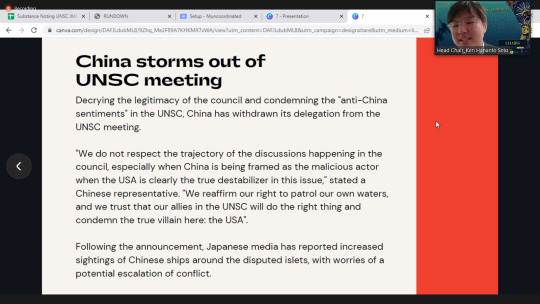
Image taken by Journalist
A big question mark is raised when the third committee session begins with the announcement that one of their biggest stakeholders won’t be joining the conference. Without a doubt, from the beginning of the conference, the rivalry between China and the US was very much obvious but one of the arguments raised by China against the US stayed in my mind.
What is the US doing here? What does the country have to do with the tiny isolated islands in the East China Sea?
China has repeatedly said that the Senkaku island dispute should be resolved bilaterally, and during the UNSC meeting, there have been no clear answers behind the reason for US involvement, further highlighting the ambiguity of its position in the eastern Asia conflict.
The United States has also mentioned that it is open to a bilateral negotiation and that the country won’t even mediate or intervene should the event take place. However, seeing as the delegation of China has decided to resign early due to the ‘anti-China sentiments’ the delegate received, it seems that the US has not done as promised.
Although the United States and Japan had signed a mutual defence treaty in 1951, the treaty did not proclaim that its coverage included the disputed Diaoyu islands.
So then what exactly is the reason behind US involvement over the dispute? The US is risking great power over something that has little to nothing with American interests.
In terms of the island’s economic value, the fishing stocks are in decline, and the number of potential gas reserves and petroleum supplies has not been confirmed, in fact, they are estimated to be much less than originally thought. Even if the islands hold something valuable in them, they hardly justify the need of using armed forces to obtain the island.
Without a doubt, China and the US have had arguments in the past and this sentiment seems to be brought up even until today, bringing the Senkaku or Diaoyu islands to another point of concern for both parties.
For China, it can be viewed that the islands for the country are worth more than historical grievances between them and US-Japan. In short, the dispute over the Senkaku islands has become much more than the islands themselves, but also about struggles over past grievances, reputation, recognition, and status.
0 notes
Text
Dissecting the Issue of PMCs: Operating in a Legal Vacuum - Haaretz
By Gabriella Al-Jareh (13/8/22)
“An apple fell and Newton discovered gravity, hundreds of civilians have been killed by the Wagner group in Africa but no one discovered humanity.” - The delegate Morocco regarding the lack of accountability when it comes to the humanitarian violations of the PMCs.

Image: Committee session in order, image taken by Journalist of Haaretz
When looking further into the issue of Private Military Companies (PMCs) the Montreux document often comes to light but with it not being legally binding, PMCs and their humanitarian violations still run rampant. Although international humanitarian laws still apply to even PMCs, the act of implementing actual penalties has yet to be set. Examples of atrocities conducted are countless as the delegate of Morocco states there are numerous PMCs contracted by foreign states, Russia with the Wagner group and the US with Blackwater to name a few, who had committed massacres before.
Case Study: The Wagner Group

The Wagner group can be seen as an example of what happens when a PMC is allowed to roam loose. They have been the conductors of several operations around the world. Reports of human rights violations have followed suit from areas in which they are deployed.
As many delegates pointed out, this still legal PMC is only masquerading as an official entity but in reality with their list of violations they should be seen as what they are: criminals working under the legal vacuum that has allowed them to thrive.
Delegates in the chamber have followed suit in asking Russia to take accountability for the Russian-based private military company that is the Wagner Group. To this Russia claims no responsibility since they have only deployed the Wagner group in only one instance, that is the ‘special military operation’ otherwise known as the invasion of Ukraine.
This avoidance of responsibility, common not only in this case but in others, stems from two things: First, as many delegates have pointed out, there is a lack of clear delineation between PMCs and state actors; Secondly, the lack of regulations and penalties for PMCs and by proxy nation states that commit illegal acts are yet to be implemented.
The Current Crisis
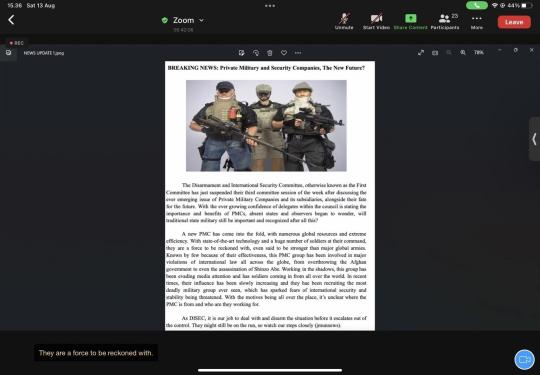
Image: Breaking news in the DISEC Chamber, image taken by Journalist of Haaretz
Nearing the end of the second day, the Disarmament and International Security Committee (DISEC) has been hit by an unexpected turn of events as news broke out about a covert PMC credited with the assassination of prime minister Shinto Abe and the overthrowing of the Afghan government. Currently, it is unclear who their allegiance lies and this highlights a key issue in the topic of PMCs: the lack of liable actors when it comes to the actions of non-state entities.
The following discussion has quickly turned into turmoil as the council scurries to find solutions to this abrupt crisis. This news has further highlighted the inhumane nature of PMC — when the military operations are carried out not with the protection of sovereignty and civilians in mind but the cold hard reality of profit.
The council, however, is stuck playing the blame game as Russia and the US are now in the spotlight as allegations are thrown regarding the nation-states behind the two events. Both Russia and the US have given their defence regarding the nation-state collaborating with this unknown PMC stating that those allegations are still alleged.
The Bottom Line
With this new development, it is now more urgent than ever to come up with a solution to stopping this mysterious PMC from gaining any more power and finding methods of surveillance and monitoring to make sure humanitarian violations will not be occurring again. Then furthering the initiative a more comprehensive solution needs to be made to ensure PMCs will not be able to roam free and do as they please, overlooking obligations to keep in line with international humanitarian law and the Geneva convention.
ADDITIONAL REFERENCES
Montreux document forum (n.d) Content of the Montreux Document. Geneva: Montreux Document Forum. Retrieved from: https://www.montreuxdocument.org/about/document-content.html
0 notes
Text
Can PMCs be used in UN Peacekeeping Operations? - The BBC
By Nyoman Wina Panjali Putri (13/8/20)

Image: UN soldiers at a peacekeeping mission., Source: https://www.e-ir.info/wp-content/uploads/fly-images/59649/4291077521_0bc4597485_o-1064x600-c.jpg
The use of private military companies (PMCs) in peacekeeping missions has been advocated repeatedly by the delegates in the Disarmament and International Security Committee (DISEC). However, are there necessary regulations currently in place to guarantee the security of these missions?
The use of PMCs in peacekeeping missions was first brought up by the delegate of Morroco during the second committee session as one of the benefits of PMCs. Consequently, the use of PMCs in UN peacekeeping missions is further implored in DISEC’s working paper 1, defining PMCs as organized companies that offer “peacekeeping services to their state or non-state clients.”
Moreover, the use of PMCs in UN peacekeeping missions is still an ongoing ethical debate. Experts have expressed concerns about whether these organizations' ability to uphold peace will be consistent with the primary goal of the UN Charter, "to save the future generations from the scourge of war," given that their primary motivations are financial gains. The fact that PMCs have been criticized for their lack of transparency also doesn't help.
Hence, what can the DISEC council do to ensure that PMCs in peacekeeping missions are properly regulated to achieve peacekeeping goals? This article attempts to assess the potential risks of using PMCs in peacekeeping missions in order to suggest potential solutions.
The main concerns of the use of PMCs in UN peacekeeping missions are accountability and transparency. This is alarming because most peace operations occur in fragile states with weak laws. Reportedly, PMCs have often violated international humanitarian law and human rights law without being held accountable. For example, in 1992, when the UN hired several contractors for a four-year peacekeeping operation in Bosnia, some DynCorp employees were discovered to be involved in sex trafficking and organized prostitution.
Additionally, because PMCs are driven by profit rather than security, it poses the argument that economic losses may prompt a PMC to “cut corners or pull out” during missions. Alternatively, PMCs might purposefully extend conflicts to sustain the business.
Aside from these concerns, PMCs have had success in UN peacekeeping missions. For instance, the success of PMC, Executive Outcomes, in Angola and Sierra Leone peacekeeping missions. Knowing this, what solutions can DISEC propose to maintain the success of PMCs in other peacekeeping missions, taking into consideration the concerns that have been raised?
It can be agreed that the council should have a set of clear mechanisms regarding accountability, control, and transparency. To achieve this, the British government’s Green Paper, suggests that only reputable PMCs could be hired for international peacekeeping duties and proposes national regulations to help the government distinguish between reputable and disreputable PMCs.
Furthermore, P. Singer has also proposed another solution to this issue by creating a special private “Rapid Reaction Force” (PRRF) similar to the Intervention Brigade that was once deployed as part of the UN peacekeeping mission in the Democratic Republic of the Congo. Operating under a Security Council resolution, the PRRF would acquire legal grounds for its involvement in conflicts. Hence, the UN would bear responsibility for the PRRF’s activity.
Such measures and potential risks should be discussed thoroughly by the delegates of DISEC if they wish to include PMCs as a part of UN peacekeeping operations in their draft resolutions. This would greatly help improve the future regulations regarding the use of PMCs, ensuring a safer future for our citizens.
0 notes
Text
United Nations Environmental Programme (UNEP) Fails To Understand The Gap Between Fortunate and Unfortunate Countries - New York Times
By Aletha Herdiman (13/8/22)
As the UNEP council has finished working on their working paper, unfortunately, there are no perfect solutions to be implemented on a roadmap to carbon taxation.

Delegates of the UNEP discussing the mechanism on carbon tax implementation (Source: NYT-Aletha Herdiman)
United Nations, New York - The United Nations Environmental Programme (UNEP) with compromising representatives — have finally introduced its working paper as means to make carbon taxation more accessible for developing countries.
Not every working paper is perfect and there is no perfect solution. That’s the case for both blocks that have created working papers. Both working papers don't answer how developing countries can actually implement carbon taxation. Instead, the UNEP council is too focused on making carbon taxation more beautiful in the eyes of the public, in other words, public support.
Public support is crucial to be discussed in the council. However, the discussion of public support was so excessive that the cherry-on-top solutions were that discussed much. Thus, policies and guidelines weren’t much discussed in the debate despite loopholes being found.
“We don't really have a structured guide on how countries should start imposing carbon taxes (the step-by-step), we think this can be alleviated by going by the World Bank's Policy Making Guide as it already provides us with a systematic of a how to create a policy,” stated by an anonymous delegate.
However, a question to be considered: will just by following a policy-making guide create a “loophole-free” policy? Will it be viable?
Creating a policy just by following the “World Bank’s Policy Making Guide” sounds too confident. Furthermore, it is utopic to create a policy simply just by following a guide from the World Bank, it is clearly unprofessional for the “official” United Nations Environment Programme itself.
Moreover, the solutions created by both blocs still lack equality and place too much pressure on developing nations in determining the tax base and developing carbon taxing strategies. Those solutions mainly focus on the developed countries and little they did put into consideration of the tax base or the carbon taxing strategies for the developing countries.
The council of the United Nations of Environmental Programme has failed to undermine accountability and create feasible solutions in order for developing countries to be able to implement carbon taxation. Developed and developing countries should put aside their ego and be more open-minded in terms of listening to the ideas and proposed solutions of each representative in order for them to find a clear path for implementing carbon taxation. Lastly, developing countries should be more rational and consider the conditions of their country when choosing a solution.
Further debates and discussions on the Working Paper and soon-to-be Draft Resolution are to be expected in future committee sessions.
0 notes
Text
The Struggles of Implementing Carbon Taxation for Developed & Developing Countries - New York Times
By Aletha Herdiman (13/8/22)
The United Nations Environmental Programme has finally finished creating its working paper to implement carbon taxation. Here’s what to know so far!

(Delegates of the UNEP council introducing their working paper, source: NYT)
United Nations, New York - The United Nations Environment Programme’s second day includes a thorough examination of the problem of carbon taxation, which begins with the discussion of the Working Papers in the third committee session.
To summarize, these past two days have produced numerous solutions created by the two contested blocs. The first bloc, which consists of Latvia, Finland, and allies, focuses their working paper on incentives, progress, transparency, funding mechanism, stakeholders' role, and public support.
“Our solutions focus on the distribution of carbon tax between developed and developing countries in the sense that there can't be one roadmap for all countries,” stated by the delegate of Finland as the representative of bloc 1.1.
Bloc 1.1 working paper scarcely touched on the elaboration and was notably devoid of a clear explanation of how the procedures would actually be implemented. This raises concerns from several delegates, mainly in bloc 1.2, because few of the solutions have illogical gaps such as task force as means to be a representative of the UNEP. Furthermore, bloc 1.1’s working paper hasn't mentioned any mechanism on how developing countries may be able to implement carbon taxation.
Meanwhile, the second bloc, which was led by the delegate of Sierra Leone, Pakistan, and allies, focuses their working paper towards policies, short-term alternatives, tax revenue use, impact assessment, tax-basing, and feasibility studies and policy experimentation context.
“Overall, our bloc has a better framework and more detailed guidelines. Though we have the same stances somehow we make different blocs,” stated by the delegate of Sierra Leone as the representative of bloc 1.2.
Although bloc 1.2 arguably has better and more promising solutions, their primary focus on the working paper is more on strengthening and correcting the shortcomings of previous solutions. Therefore, they don't appear to be new or progressively beneficial.
Despite both blocs having the same commonality, which is to implement carbon taxation in developing countries and to improve carbon taxation in developed countries. Both blocs haven’t found any mutual agreement for them to merge blocs and instead focus on finding faults in the opposing bloc’s working paper.
As the third committee session has come to an end, it is uncertain how the UNEP council can find a mutual agreement. Will the UNEP council prevail? Stay tuned to find out!
0 notes
Text
The Developing Infrastructure Investment of S. Korea - Chosun Ilbo
By Ghefira (13/8/22)
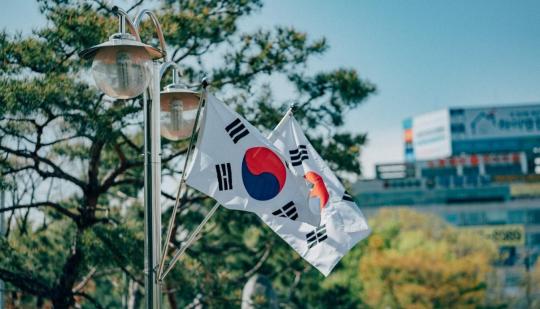
Source: https://www.senecaesg.com/wp-content/uploads/daniel-bernard-qjsmpf0aO48-unsplash-e1626341722879.jpg
Infrastructure is one type of asset that is tangible and important for expediting a country’s economic investment. The infrastructure investment namely roads, bridges, transportation, electricity, communication systems, health supplies, energy, and other things will be necessarily needed for improving society’s life. This kind of investment has been around since the 1980s.
One of the most alluring aspects of infrastructure is the promise of consistent financial flows. Given that the asset frequently comes with a regulated and contracted revenue model, it generates regular and predictable cash flows. In addition, this investment also uses low variable costs.
Given the many benefits generated, countries have seized the opportunity to develop their economies through infrastructure investment. Including South Korea. They experienced limited infrastructure investment in the 1990s, especially from the private sector. It collaborated with private businesses on large infrastructure projects, such as building the Korean parts of the Great Asian Highway, to address the problem.
Considering its quantitative and qualitative expansion during the last 60 years, Korea's infrastructure investment experience is very noteworthy. Despite fierce competition from China, Singapore, and Japan, Korea also opened Incheon International Airport, which was named the best airport in the world by Airport Council International for seven consecutive years (2005–2012). A hub port in Asia, Busan Port was listed as the fifth container port in the world as of 2012.
Developing nations can benefit from Korea's impressive infrastructure growth. Infrastructure investment is the outcome of interactions between the suppliers, primarily the government, and the demands of the private sector. Thus, we must analyse the roles of the private and governmental sectors equally in order to provide a balanced perspective.
The debate that follows, however, is mostly focused on how the Korean government has steered infrastructure investment in Korea because it takes a proactive role in this area. The internal stakeholders, including the government and the ministries, has a resourcefulness plan.
First, the project was planned and carried out by the government in collaboration with the Ministry of Strategy and Finance. Second, The Ministry of Planning and Budget proposed developmental strategies for the project. Last, the government carried out a Total Project Cost Management System to control the ever-increasing cost of infrastructure investment by escalation clauses or changes in design.
By establishing the Korean Infrastructure Guarantee Fund, the government supplied funding for the endeavour (KICGF). Government grants, MRG payments, other guarantee fees, and bank loans all contributed to the capital of this fund.
Budget restrictions currently affect Korea, just like other nations, which makes it more difficult to finance various projects. The government has started utilizing private cash as a partial solution to the issue of budgetary restrictions. There is no guarantee that the private sector will offer an affordable, high-quality infrastructure because it prioritizes its own interests over those of the general public.
In particular, by guaranteeing a minimum revenue to private investors, the government unnecessarily assumes financial risks due to information asymmetry when it enters into a contract with private companies. Governments must conduct rational policy analyses to determine the viability of economic and policy initiatives in order to reduce the knowledge asymmetry between the public and private sectors.
Although the Korean experience demonstrates that rational policy analysis is not without flaws, institutionalizing it can aid governments in strengthening their administrative capabilities. Additionally, it compels the private sector to provide any information that has been kept secret. Therefore, improved planning and analysis is the right way for developing countries to enhance infrastructure investment.
ADDITIONAL REFERENCE
South Korea’s infrastructure prioritisation plan. (n.d.). Centre For Public Impact (CPI). https://www.centreforpublicimpact.org/case-study/infrastructure-prioritization-plan
0 notes
Text
Infrastructure and Education, Which One is Important in the Creative Industry? - NHK World
By Nandana Ardra Kurniawan (13/8/22)
In today’s committee session, the UNCTAD council is having an intense debate between two blocks of delegates, concerning investment, infrastructure and skill gaps issue in the creative industry, especially those in developing and underdeveloped countries, where there is still a lack of government support, investment from companies, and also technology and infrastructure for the industry.
The council then is divided into two blocks, with each block having its own working papers, proposing ideas and programs that can be implemented in the creative industries, while both working papers from both blocks have a difference, there is also a similarity, between the two. However, in the third committee session, it seems there has been a debate between the first block and the second block, with the first block thinking that the second block is focusing more on infrastructure than on tackling skill gaps which then gets countered by the second block with the state members of the second block saying they’re not just focusing on infrastructure. It was a heated debate.
What caught my eye is a program that is proposed by Romania, called the “Clever Project” which is short for inCLusive Economic deVelopmEnt pRoject which has three stages:
Training those who have skill gaps
Applying the worker’s skill in the real world with job exchanges
And then, technology transfer
This caught my attention as it not only improves worker’s skills but also their lives as well. Other blocks also proposed a program with the same purpose as well, such as a program proposed by the delegate of Nigeria called “Tahu Unyu” which is a program to help skilful youths in the creative industry, enhance their skill, and also promote their talents which can help them find jobs.
But with, all these programs and ideas proposed with different names, all of them have the same goal, which is to improve the creative industry, by educating and also bringing investors such as big companies and start-ups, etc. into the industry.
Speaking of investors, how should countries allocate the funds? Is it the infrastructure or the education?
The delegates UNCTAD seems to come to an agreement that both are important, and I personally agree with that, since with the lack of updated infrastructure it is hard for the workers to create high-quality work, but with the lack of education then it’s also hard for the workers to operate the technologies that have existed. A lack of both can result in the investors withdrawing their investment.
Other than that, some delegates also mentioned about the lack of government support is also giving a big impact on declining the growth of the industry. I think this is also important, especially in developing countries such as Indonesia, where the support from the government is lacking which causes so many workers in the creative industry, such as game studios, illustrators, designers etc. These actors are short on funding which resulted in them closing down their businesses, or moving to another country.
What’s important is also the support of the locals for their local creators, with them supporting the local creators or artists, such as buying their goods; giving them donations can also help them.
In conclusion, education, funds, and infrastructure are important in the creative industry. As a closing remark, I want to say the delegates of UNCTAD are very passionate about the topics they’re talking about, and with them deciding to merge the ideas of the two blocks, I believe the future of the industry is in good hands.
0 notes
Text
UNCTAD TAKING INSPIRATION FROM BOLLYWOOD? - Press Trust of India
By Ahmad Riaz (13/8/22)
What kind of inspiration could the UN possibly get from extravagant dance sequences and over-the-top dialogues? After getting the chance to attend today’s United Nations Conference on Trade And Development session I can say that the similarity is definitely there. The suits and local dresses, the over-the-top rhetoric at the start of delegates' speeches, and of course the drama within the chambers. Do you notice it now?
The debate revolved around the agenda of the committee which pertained to global and regional Creative Industries. Delegates raised points regarding the issues that their respective countries face. Issues such as theft of intellectual property, lack of government investment, job opportunities, and social inclusion.
While observing delegates mention possible solutions, I noticed that a lot of them can be seen within India. For example, the Film Wing of the Indian Government provides Monetary Aid for the production of films. Which is a solution to the lack of Government investment that some countries receive. Of course, other countries' problems are more nuanced than this but it is proof of the concept of an effective solution.
Delegates also mentioned a lack of workers within their respective Creative Industries. The Indian Government has started multiple campaigns promoting and encouraging workers to join the creative industry. This is backed up by the 40 million people working in the Indian industry. This is excluding all those working in Bollywood, the largest, and most productive film industry in the world.
As far as social inclusion is concerned, Indian Art has been an amalgamation of cultures for centuries. With influences from Hindhu, Muslim and Buddhist philosophies among others. Coming back to the diverse Indian film industry, India releases films in more than 10 languages which are watched all over the world. Numerous Indian actors featuring in western media are also an example of creative labour being geographically mobile. Which was one of the aims that the committee wishes to achieve on a global scale. The delegate representing India also shared these points with the committee and followed it by saying, “We are willing to contribute to other developing states”.
However, something that felt strange to me was that most of the committee also shared this sentiment but it ended up being divided into two separate blocs. Blocs that were working towards the same thing and solving the same problems. Eventually, towards the end of the session, the blocs were headed on the path to a merger. A merger that I feel is necessary.
While there is a lot to learn from the way India has managed its Creativity Industry, we are by no means perfect. There are still major problems present within our industry. Problems such as piracy and low wages to workers. These issues shouldn’t only be acknowledged by the delegate of India but also by the Indian People. In the words of the delegate of Fiji if this continues then, “We will be taking one step forward and two steps back”. Hopefully, the committee will be able to come to a resolution that takes us, and the world, forwards.
0 notes
Text
Letting Two Nations have ‘Sovereignty’ over One Area is a Recipe for Disaster - Fox News
By Felicia Audrey Nugroho (13/8/22)
Without settling where the Senkaku Islands truly belong, it’s to no one’s surprise that conflict will arise again.

(Source: taken by the Fox News journalist; capture of discussion upon Working Paper 1.2)
After 3 sessions of challenging debates, the United Nations Security Council (UNSC) has returned for its 4th session of discussion on the dispute over the Senkaku/Diaoyu Islands. The council’s proceedings have grown into a much more complex one, with more crisis updates being thrown left and right.
Though we can see why the delegates of this council are putting much thought into the discussion over the islands, it is important for us to question this issue, regardless if we are a delegate or not. This whole issue is of bizarre nature already. It is well known that the Senkaku Islands have had a significant impact on Japanese history and territorial claims. However, other nations, especially China, continue to assert their sovereignty over the island.
Knowing this fact, sensibly speaking, it is necessary that by the end of the United Nations Security Council’s discussions that a single role of sovereignty and authority over the islands is decided. Most ideally, we should remember the history behind the islands, and how since the beginning, Japan has had international law to support its sovereignty over the islands.
Why so?
Here is the core of the issue — China has been contesting the sovereignty of Japan over the Senkaku Islands, even to the point where another name is known for the islands, which is the Diaoyu Islands. This contention only occurred after those on the Chinese side discovered how the islands may possess an abundance of beneficial resources. It is true; the Senkaku Islands are significant due to their strategic economic settings. They are positioned near potential oil and gas reserves, close to important shipping lanes, and offer plenty of fishing areas.
The fact that it possesses resources that are so well regarded, however, does not imply that it is free to use or that its owner can be changed so easily. China acknowledged Japan's control of the islands through the 1895 Treaty of Shimonoseki. Already, there is clear historical evidence for this. China has admitted that Japan is the island's legitimate owner. For them to abruptly change their argument is a way to disturb international law and history.
So, what needs to be done about this? The solution is simple.
Decide upon who owns the islands. Most ethically, know who has been taking care of the islands, and let them continue their duty as written in international agreements.
By forming a decision on who has possession over the island, it will be clear whether the islands will be known as the Senkaku Islands or as the Diaoyu Islands, and it will be clear who is at fault, in a case where territorial laws are broken. The decision of how to use and divide the island's riches will subsequently be made by whichever of the two currently-at-odds nations. This is perfect for preserving Sino-Japanese relations and world peace.
Without a decision on this, conflicts will occur constantly, and debates will continue fuming.
Contrary to how straightforward the solution is, this is not a simple task. It is difficult to counter China's fervent desires. We can see it ourselves through the UNSC here, where China has opted to leave the discussion instead of reconvening with the other delegates in the council. Other major delegates here must make the hefty and comprehensive decision on what to do with the islands and hopefully, they would get to fulfil it soon, as the end of the conference is just in two committee sessions. Even if an owner of the islands is not decided, let us hope that a way to mediate is decided upon.
ADDITIONAL REFERENCES
Ministry of Foreign Affairs of Japan. (n.d.). Situation of the Senkaku Islands. Ministry of Foreign Affairs of Japan. Retrieved August 12, 2022, from https://www.mofa.go.jp/a_o/c_m1/senkaku/page1we_000010.html
Treaty of Shimonoseki, 1895. USC US-China Institute. (1901, December 13). Retrieved August 13, 2022, from https://china.usc.edu/treaty-shimonoseki-1895
Viswanathan, M. (2015, July 2). Senkaku/Diaoyu Islands: Significance, challenges and opportunities. International Strategic and Security Studies Programme | NIAS | India. Retrieved August 13, 2022, from http://isssp.in/senkakudaioyu-islands-significance-challenges-and-opportunities/
0 notes
Text
It's Time vs UNESCO — and they are still talking about definitions - Toronto Star
By Abigail Grace (13/8/22)
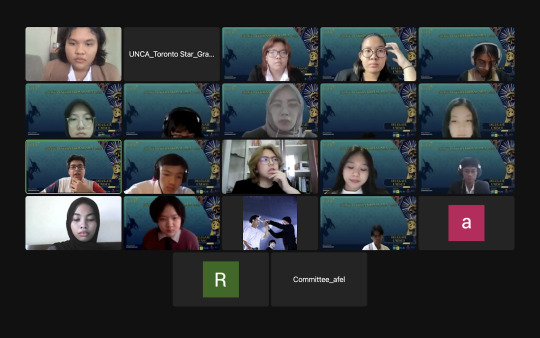
Chaotic scope of discussions in UNESCO’s unmoderated caucuses. Picture by Abigail Grace (Screenshotted on Aug 13, UNESCO Committee Session)
The UNESCO should understand that defining terms for almost four committee sessions does not help resolve perceiving cultural heritages, their supposed main concern.
The United Nations Educational, Scientific, and Cultural Organization (UNESCO) held its third committee session on August 13th, 2022, on 12.30 PM GMT+7, which was filled with each country’s interests and concerns without any united goal in resolving a relevant issue.
Afghanistan brought up the issue of government interference, Poland and Eritrea kept bringing up their proposed social media page to raise awareness, and other countries brought up new issues that were irrelevant to the previous discussions and raised issues, failing to recognize the in-depth and unresolved issues of how it started in the first place.
However, thankfully, there is finally a light at the end of the tunnel. Some delegates started to question the council’s focus.
The delegate of France started the concern by bringing up this issue and asked other countries to unite their focus and focus on issues that have been brought up and address the issue of Tangible Cultural Heritages (TCH) before moving on and shifting focus to the Intangible Cultural Heritage (ICH).
“The definitions and root causes have been discussed, but the discussion has not been as effective as it should have been,” said the delegate of France.
Following that, during the fourth committee session held on the same date, the delegate of Afghanistan showed the same concern and stated that the working paper was a false form of unity by saying a controversial statement: "Is this true unity or the unwillingness to discuss contentious at hand?"
“Solution this, solution that, yada yada yada, but how can we solve diverse issues without identifying the root causes as to why some countries are against protecting cultural heritages in the first place?” said a "new-comer", the delegate of the United Kindom.
However, these questions those not reform the council at all. Countries are still focused on other irrelevant issues, showing zero care towards other nations.
Preserving cultural heritages is supposed to be a unanimous goal for this council’s discussion. The initial main concern is to raise awareness and shed light on the issue of preserving cultural heritages. Before the panel moves on to the next issue, the awareness issue must have been addressed first.
Finding common ground is a challenging problem that has yet to be addressed, but it is urgently needed to preserve the cultures of humankind that should be shown to the world.
As stated succinctly by the delegate of Poland, “we are proud of our culture, and we would like to ask other countries to be proud of theirs and each other's as well.”
0 notes
Text
Raising Awareness to Preserve Cultural Heritages: an Attempt by Poland - Toronto Star
By Abigail Grace (12/8/22)

Poland emphasizes the importance of awareness of protecting cultural heritage. Picture by Abigail Grace (Screenshotted on Aug 12, UNESCO Committee Session)
Every country's cultural heritage contributes significantly to the world's cultural heritage (UNESCO, 1983).
As the value of cultural heritage has become more widely understood, international organizations dedicated to protecting, promoting, managing, and disseminating cultural heritage have been strengthened (ICOMOS, 1999; UNESCO, 1983). By this, society reaches a fundamental level of social conformity and guarantees the survival of traditional ways of life.
On the 12th of August 2022, The United Nations Educational, Scientific and Cultural Organization (UNESCO) held its first committee session, discussing the importance of preserving cultural heritages.
The issue of the lack of awareness was first brought, and the delegate of Poland, one of the main speakers, linked it with the effects of globalization.
Globalization has encouraged communication, understanding, and respect worldwide by fostering frequent cultural exchanges (Hietala, 2012). It has brought about frequent cultural interactions while fostering dialogue, comprehension, and respect across all racial and ethnic groups worldwide.
However, how can the council ensure that globalization's positive effects can be maintained?
The delegate of Poland had realized this concern. He emphasizes the importance of awareness in preserving cultural heritages to be able to welcome the positive effects of globalization.
“Globalization has made us perceive too much knowledge at the same time. Unfortunately, without awareness, most of the commands individuals receive will not stick for a long time because they don't grasp those issues,” claims the delegate of Poland.
During a personal interview, the delegate of Poland proposed some of his ideas to raise awareness and educate citizens by creating a social media platform called “_World.”
“It started as a place to showcase cultural heritage and practices from all over the world. The page's content can come from National Television or Tourism Board, NGOs trying to preserve a culture, or even individuals wanting to showcase their unique culture.”
The delegate of Poland also adds that the primary goal of this page is to give each country an equal platform in a place with too broad boundaries and educate on what's right and wrong to do in certain countries.
The forum exists to reaffirm, expose, and respect the world's culture available with the hope of enhancing the positive effects of globalization towards the awareness of cultural heritages.
0 notes
Text
LINES DRAWN WITHIN THE COMMITTEE - Press Trust of India
By Ahmad Riaz (13/8/22)
United Nations Conference on Trade and Development: On Saturday placards were raised to pass a motion for an unmoderated caucus, and voices echoed through the chamber, which eventually led to a rift forming in the committee. A rift that had no reason to be there in the first place, a sentiment held that is held by certain delegates within the committee. The committee was now close to a 50/50 divide, with both sides of the room wanting the same things. Development in their respective and global Creative Industries.
Problems such as lack of government support, lack of skilled workers, and theft of intellectual property, among others had been brought forward. Efforts to potentially solve these concerns are also being made through the drafting of each bloc’s working papers. The working papers mention frameworks such as “Project CLEVER” that are intended to tackle the aforementioned concerns.
If the committee successfully manages to implement the policies that they are so heavily advocating for, then it would be the most comprehensive resolution regarding the Creative Industry we have seen to date. Implementation could lead to increased domestic funding, increased international cooperation, increased output, and protection of workers in the industry. Funding will also be available to help industries get back on their feet that have been severely affected by the Covid-19 pandemic.
However, there are concerns regarding the division present in the committee, despite no geopolitical agendas being involved as of now, a split is still present. Furthermore, there are no major contentions between the two blocs. There is a belief among experts that the committee is “taking two different roads which lead to the same destination”. The absence of a clear majority may lead to neither party being able to get their resolution passed. This unfortunate circumstance occurring will mean that all diplomatic efforts have gone to waste.
There is still reason to be hopeful that the committee will come to the best possible conclusion, bearing in mind that we are still in the preliminary drafting phase. There is also the possibility that on the last day of debate, the committee could present a united front and decide to unanimously pass a single resolution. Only time will tell.
0 notes
Text
The Necessary Evil of Private Military Companies - Haaretz
By Gabriella Al-Jareh (13/8/22)

Image source : https://www.fairobserver.com/region/north_america/rise-private-military-companies-01478/
The second day of the Disarmament and International Security Committee (DISEC) has veered into an interesting perspective. The sometimes contradictory statements mentioned by the delegates consisted of detailing the need for regulation of Private military contractors (PMCs) to restrain the atrocities of such an unregulated entity and then veering off to an unorthodox perspective: the benefits of PMCs.
The council played devil's advocate in one moderated caucus by stating the benefits of PMCs in certain regions. It cannot be denied that there is a need for PMCs in certain situations and the logistical, technical, and military insight that these entities hold is beneficial in volatile post-conflict and conflict areas. When a niche opens, something will inevitably fill it in. The current political landscape of small-scale war in fragile states has opened the niche for PMCs to thrive.
With that being said, the lack of regulation that PMCs operate in today is just short of abhorrent. PMCs are the cause of many atrocities and humanitarian violations and it seems during the third committee the council has circled back to that sentiment. Even with the benefits of PMCs, at the end of the day regulations are needed to stop the ongoing brutality inflicted by PMCs as nation states look the other way. As the delegate of Chad has mentioned in a private interview, while the actions of PMCs in a foreign land have to be looked at on a case-by-case basis, many actions enacted are not justifiable.
The situation is clear: the accountability of PMCs which so far has been a grey area in international law needs to be written on paper. The humanitarian violation acted by these entities needs to be regulated by clear-cut regulations and penalties to be effective and prevent future humanitarian violations.
The topic of accountability has been mentioned multiple times during this council yet the subject of state accountability has yet to be addressed in more detail. The responsibility of upholding international humanitarian law specifically for nation states needs to be addressed but as the delegate of Spain has said “[...] setting the level of state liability is a herculean task”. Hopefully, such an urgent topic will be tackled more in the following committee sessions.
0 notes
Text
Weighing the Pros and Cons of PMCs: Which Side Are You On? - The BBC
By Nyoman Wina Panjali Putri (13/8/22)
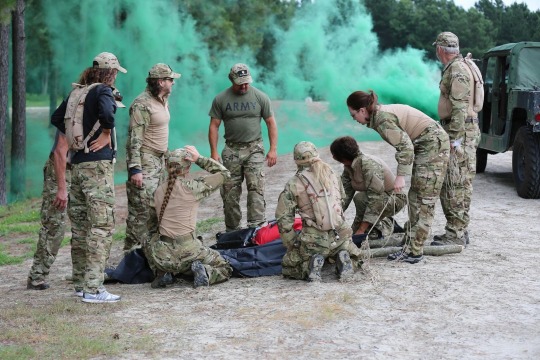
Image: Academi Private Military Company, Source: https://shootinfo.com/wp-content/uploads/2020/04/academi-.jpg
It is agreed by all members of The Disarmament and International Security Committee (DISEC) that using private military companies (PMCs) is advantageous.
The discussion of the benefits of PMCs, which was brought up by the delegate of Switzerland, is the focal point of DISEC's second committee session.
PMCs refer to independent companies that provide military services to governments and organizations. This is not to be confused with mercenaries, who are individuals hired unofficially by the government to perform military-related activities as soldiers.
The delegate of Chad summarizes the discussion by stating that PMCs are beneficial as it is cost-effective, logistically efficient, and more technologically specialized.
When employing PMCs, the government does not have to purchase more weapons as PMCs are already equipped with their own specialized technology. Furthermore, PMC soldiers have also undergone years of training and are more specialized. The government also has the ability to hire PMCs anywhere in the world, including those who are closer to their target area. Hence, reducing the cost of transportation.
She also emphasized that the use of PMCs is not always associated with violence as they can also serve to train the government’s military and protect areas.
The delegate of Morroco further implored the topic of protection. He believes that PMCs can “provide humanitarian aid, medical aid, and perform peacekeeping tasks.”
However, as he also previously mentioned, there are always two sides to a coin. Though PMCs can be beneficial, potential risks of PMCs should also be considered.
The delegate of Burkina Faso has raised the issue that the council should talk about how to regulate and monitor these PMCs in order to make sure they continue to uphold international law.
Moreover, to regulate PMCs, the delegate of Chad had also proposed that the council create a new UN body.
Hence, the council must take legal grey areas into account and hold PMCs accountable, especially in light of the "Blackwater" PMC incident, in which illegal murders were committed but no charges were brought.
The current flow of discussion seems to show that delegates are leaning toward the benefits of using PMCs. However, as the committee session continues, resolutions to mitigate these concerns regarding the use of PMCs are anticipated.
ADDITIONAL REFERENCES
Encyclopædia Britannica, inc. (n.d.). Private Military Company. Encyclopædia Britannica. Retrieved August 13, 2022, from https://www.britannica.com/topic/private-military-firm
BBC. (2020, December 23). Un criticises Trump's pardons for Blackwater guards jailed over Iraq killings. BBC News. Retrieved August 13, 2022, from https://www.bbc.com/news/world-us-canada-55424397
0 notes
Text
Is Carbon Tax a Good Idea? - El Pais
By Eugenia Yohana Harjono (13/8/22)
Carbon tax has been proposed as a solution to the problem of climate change. The question now is what is hindering the implementation of the carbon tax.

https://phys.org/news/2013-01-factory-clouds--chin-pollution-pledges.html
The concept of carbon tax is one where a price is placed on the amount of carbon a business emits. It is one of the measures that the world’s countries have chosen as a way to fight against climate change. However, during the United Nations Environment Programme (UNEP) committee session, there were many who voiced out their reasons on why there are problems that are hindering the implementation of the carbon tax.
The main problem that all the delegates expressed concern for was the effect it would have on the citizens of developing countries and the global economy. There are developing countries that are unable to implement the carbon tax due to these reasons, as it would disrupt their whole system. This is not to say that it will be impossible to do but just that it is not possible at this very moment.
The delegate of Canada was the first to speak on this matter stating, “Canada would like to put focus on one that we think is pivotal to the success of carbon taxation, that would be how carbon tax has the potential to unfairly disadvantage low-income households”.
The topic was then carried on by the delegate of Taiwan who mentioned how the carbon tax would have an impact on the welfare of those with low income. With the implementation of carbon tax, it might do more harm than good for those in lower-income households.
There are also countries that are heavily reliant on fossil fuels, some of which have made fossil fuels as the main source of their economy. The implementation of carbon tax would then cause more harm than good if countries were to suffer.
Later on in the committee session, the delegate of India stated that carbon tax would not lower carbon emissions as it would only result in placing a price on the carbon being emitted. Instead, the delegate suggested an alternative plan to carbon tax that would instead limit the emission of carbon.
As of now, there is no clear solution to what needs to be done in regards to carbon tax. However, the delegates inside the UNEP council are working on an idea that will hopefully help in the fight against climate change.
ADDITIONAL REFERENCES
Infrastructure Podcast | A Carbon Tax Affects Poor and Rich People Differently. (2022, January 19). World Bank; www.worldbank.org. https://www.worldbank.org/en/news/podcast/2022/01/19/tell-me-how-a-carbon-tax-affects-poor-and-rich-people-differently
0 notes